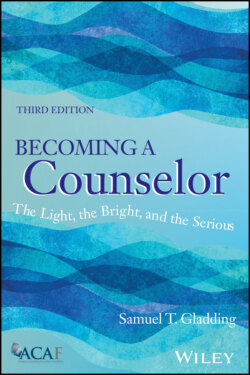Читать книгу Becoming a Counselor - Samuel Gladding T., Samuel T. Gladding - Страница 45
Chapter 31 A June Night in December
ОглавлениеWhen I was 18, as is true with many male adolescents, I was infatuated with a young woman and yet scared to death to ask her for a date. Her name was June and she was 16 (going on 17). I found her warm name and personality inviting. Best of all, she lived just a couple blocks from my parents’ house. When I went off to college, we exchanged letters and she took the initiative and asked me to the Snow Ball, a wonderfully exciting dance in December that was completely misnamed because we lived in Georgia. I enthusiastically accepted.
On the night of the grand occasion, I picked her up, and after chatting with her folks for a few minutes we made our way to the car. I could tell that romance, rather than any frozen precipitation, was in the air. Her eyes were as dilated as mine, which was probably the reason for what happened next.
I opened the car door for June, and after she slipped in gracefully I closed the door behind her with a flare and quickly, yet lightly, walked around to my side of the car (knowing I was on the street where she lived). After getting in, I looked over at her, expecting romantic glances and maybe even a kiss, but to my astonishment she was crying.
“Oh no,” I thought. Like any 18-year-old boy I did not know what to do when a girl cried. I had been assured by Frankie Valli and the Four Seasons on the radio that “Big Girls Don’t Cry,” and I thought June was a big girl. However, I had sense enough to ask what was wrong, as her tears had sobered me up enough to realize that this enchanted evening just might be different from what I had planned.
“Why are you crying?” I asked. “Are you filled with emotion and riveted with thoughts of you and me?”
“No,” she sobbed.
“Did you just think of something unpleasant?” I queried.
“No,” she insisted.
“What is it then?” I finally said in an open and inquiring manner.
“You just slammed the car door on my hand!” she blurted out.
Sure enough, to my dismay, as I looked up I realized that not only had I slammed her hand in the car door but it was still caught there. Thus, like an Olympic sprinter, I was out of my seat, on my feet, and around to try to relieve the pressure faster than you could say “emergency room,” which is where we ended up that night.
As embarrassing as this night was, it was not the end of my relationship with June. When she got the bandages off I visited and wrote her a sappy poem. She liked the attention and her hand finally healed. I still occasionally encounter her, but she keeps her distance, as if I might handle the occasion in the wrong way again. The faux pas of that night lives on.
I look back occasionally in reflection on that time—a hard night that still gives me chills. It is a memory of teenage awkwardness and growth. June is a reminder that the way to a young woman’s heart is not through her hand! However, events that go wrong can turn out better in the long run than they appear at first. That goes for mistakes we make in counseling as well as blunders we make in life. Time and attention to aspects of our lives that are hurt or shattered can do much to make them better.
